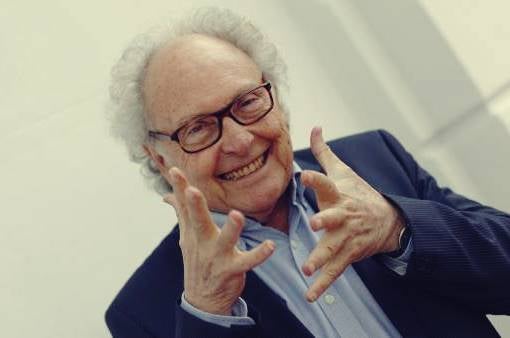We said goodbye to his charisma, his incomparable voice, his hair like Albert Einstein, his remarkable ability to convey our passion for science, etc. Eduard Punset was all that and more.
A media as well as a loved one who marked a before and after in the field of scientific dissemination on Spanish television with his program Redes. With his farewell, at 82, we are certainly in a great void.
- He seemed like a distracted scientist.
- And although his personal career was related to politics and law.
- Punset knew very well what he wanted to convey on his Sunday morning show.
For almost 18 years presenting and managing networks, he managed to do what only personalities like Carl Sagan, for example, did in his day: arouse the curiosity of thousands of viewers for science.
With interviews such as those conducted with Roger Penrose and Max Tegmark, he managed almost instantly to make us want to become physicists or cosmologists to continue delving into the origin of the universe.
Through conversations like the ones we had with Jane Goddall, Lawrence Krauss, Antonio Damasio and Steven Pinker, we were able to understand ideas and theories about our origins, what emotions really are and the possible future we have before humanity.
Physics, biology, psychology, neuroscience, cosmology? Eduard Punset invited us on a journey of exciting knowledge and discovery thanks to his own enthusiasm and curiosity surrounded by tireless optimism.
Therefore, it is not easy to say goodbye to someone who has encouraged and even awakened vocations among hundreds of young people. Fortunately, we still retain its great audiovisual heritage and also its multiple publications.
“The knowledge of who we really are, of our weaknesses, helps us to be happier” – Eduard Punset-
There are those who have always seen with skepticism the fact that Eduard Punset was considered an announcer of science. Punset, who came from the world of law with a postgraduate degree in economics from the University of London, also had a long career as a politician. .
First at the Democratic and Social Centre of Adolfo Suarez and then as a Member of the European Parliament from 1987 to 1994.
It was his great communicative capacity that led him to offer a scientific program by Television (TVE, a company that manages Spanish public television).
In fact, Punset had no academic credentials or training related to many of the fields in which he immersed himself each week.
However, he had other characteristics to offer: charisma, scientific intuition and a clear ability to convey knowledge in a simple way, infecting everyone with his own passion.
If the United States of the 1980s had Carl Sagan on the Cosmos program, Spain had Eduard Punset on Networks, and it didn’t matter if the show aired in the early hours.
Each week he received thousands of spectators willing to be surprised, to transform from lay people from the world of neuroscience, astronomy or biology into subjects in love with these unique universes.
The program began airing in March 1996, but in 2008 it underwent a change that will make history: Redes became Networks 2. 0 and every week Eduard Punset interviewed an internationally renowned specialist.
Suddenly, and for the first time, the world of science presented itself to Spain in an innovative and above all intimate way.
Those who had to get up early the next day used to record the show, because it was true that every week something new was learned and such important personalities as Oliver Sacks, James Watson and Francis Crick, Steven Pinker, Robin Dunbar, Lawrence Krauss, Roger Penrose, Jane Goodall, Antonio Damasio, Daniel Dennett and Lynn Margulis.
The English interviews were dubbed by Punset himself, so the public has inadvertently become accustomed to understanding all the ideas, theories and scientific perspectives presented through his voice and unforgettable charisma.
By presenting the Networks program, Eduard Punset began a new work as successful as: book editing.
Works such as Journey to Happiness (2005), The Soul Is in the Brain (2006) and Why We Are Who We Are (2008) began a time when suddenly access to basic scientific subjects ceased to be complex, largely because it was the opposite.
Diving in these pages was a pleasure, it was a stimulating and educational trip.
In his books we did not hear his voice, but there remained that unmistakable brand of the promoter that facilitates the complex, that proposes theories, rigorous data and that transforms science into a path where you always want to know more.
Perhaps that is why other works have appeared, such as Viagem ao amor (2007), Viagem ao poder da mind (2010) and El sueo de Alicia (2013, without translation into Portuguese), in which Eduard Punset entered another field in which he would remain: self-help.
The Networks programme ended in January 2014 and Punset has gradually separated from the field of scientific dissemination to focus, more specifically, on personal growth and self-help through the Apol (Apoio Psicol-gico Online) project.
Punset’s gradual exit from the media has been accelerated by its health problems in recent years.
Eduard Punset has left us and, with his absence, whether we like it or not, the world of science is a little more orphaned for a simple reason: the world needs scientists, but also personalities who know how to convey the magic of knowledge.
Eduard Punset had the glow of a nebula and the passion of a child who longed to know everything. Your light will shine forever. We preserve its audiovisual and literary heritage, which we must remember whenever we need it.

